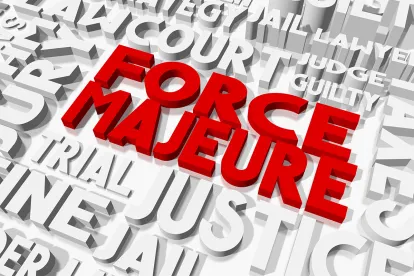Introduction
Throughout the COVID-19 pandemic, real estate lenders will be dealing with commercial lease defaults and need to consider the following issues:
-
The language and likely construction of any force majeure clauses on which tenants may attempt to rely due to failure or inability to perform on their lease covenants
-
Continuous operations covenants or prohibitions on “going dark” in light of government restrictions on business activities and limitations on gatherings
-
Potential government prohibitions on landlords pursuing their eviction remedy
-
The scope and coverage of any applicable business interruption insurance
Soon after the spread of COVID-19 and the resulting significant impact on brick-and-mortar retail and other commercial activity, real estate lenders began to take a fresh look at their loan documents and key tenant leases to prepare for potential tenant cash flow issues and lease defaults. Commercial tenants have and will continue to request of their landlords concessions like rental deferments, rental abatements, and waivers of certain lease defaults. Lenders must continue to take a proactive approach with their borrowers, not waiting for loan defaults to inevitably occur. Lease-related provisions and issues to consider during the current pandemic include the following:
Force Majeure
Force majeure clauses in leases will be critical in the wake of the wide-ranging impacts of COVID-19. These provisions temporarily excuse non-performance by a party in the event of certain extreme events (each a “Force Majeure”). Depending on the drafting of the applicable language, upon a Force Majeure, the tenant may be excused for a set period of time, or indefinitely, from performing its obligations under the lease. Obligations to pay rent and other amounts under the lease are often, but not in every case, carved out of the Force Majeure clause.
Specified Force Majeure events typically include war, natural disasters, civil disturbances, or government acts that prohibit or delay performance under the agreement. Force Majeure clauses can be heavily negotiated and may be limited to the events expressly enumerated in the agreement, or may contain more expansive language contemplating other events not specifically listed. For example, a clause may state “including, but not limited to…,” or the like, or could even go so far as to include acts that are outside the control of a party to the lease.
In the context of COVID-19, a more tenant-favorable Force Majeure clause would specifically include events such as “pandemics,” “diseases,” or “public health emergencies,” however, these have not commonly been included in Force Majeure provisions in the past. A more likely scenario is that a tenant would claim either that (i) COVID-19 would be covered by a catch-all Force Majeure event such as an “Act of God,” or “governmental restrictions” or (ii) that the open-ended language of the provision (“including, but not limited to…”) is intended to include pandemics like the current one. Depending on the common law of the applicable jurisdiction, a court may construe the open-ended “without limitation” language to allow for inclusion of only events similar to those specifically enumerated, or, conversely, to allow for inclusion of only events dissimilar to those specifically enumerated. With respect to a catchall provision like an “Act of God,” courts may also limit the applicability of such term if they deem the risk of the event to have been foreseeable at the time of contracting.1
Even if COVID-19 qualifies as a Force Majeure event under the applicable lease, a tenant’s performance may not be excused unless it is objectively impossible or commercially unreasonable to perform. Courts have often held that a Force Majeure provision “must be accompanied by proof that the failure to perform was proximately caused by a contingency and that, in spite of skill, diligence, and good faith on the promisor’s part, performance remains impossible or unreasonably expensive.”2
In the event the lease in question does not have a Force Majeure provision, tenants may still seek relief under common law doctrines such as “impracticability,” which may excuse performance if performance would otherwise be impractical due to consequential and significant hardship to one of the parties,3 or “frustration of purpose” which may apply if the performance is no longer of any benefit to a party (such as a space that cannot be legally occupied). Given the unprecedented nature of the COVID-19 pandemic, there is little guiding precedent in place in this vein, but courts may offer relief to tenants affected by COVID-19 under this doctrine in the future.
In summary, upon any actual or potential claim of Force Majeure by a tenant, the lender should consider (i) the Force Majeure language in the relevant lease and (ii) how courts have interpreted Force Majeure clauses in the applicable jurisdiction.
Covenants
Many commercial leases, particularly in the retail sector, contain negative covenants that prohibit tenants from “going dark” for a period of time. Meanwhile, tenants are often required to comply with all applicable law. Given current “shelter-in-place” and “stay-at-home” orders and future state and local government restrictions on business activities and limitations on gatherings, tenants may be forced to violate any lease covenants requiring continuous operations on the leased premises in order to comply with applicable law.
In expectation of a potential tenant request for a covenant deferment, amendment or waiver on these grounds, lenders should review tenant obligations under the applicable lease and potential co-tenancy requirements of other leases on the encumbered property, as well as understand their own rights in the relevant loan documentation and SNDAs to consent or refuse to consent to any proposed waivers or amendments.
Evictions
As state and local governments continue to enact restrictions on business activities and limitations of public gatherings, tenants may be unable to meet required rent payments under their leases. In such cases, many commercial leases permit landlords to evict a tenant. However, landlords (and lenders) should act with caution when considering exercising the eviction remedy for several reasons.
Governmental restrictions on operations and gatherings will affect any potential replacement tenant just like the would-be evicted tenant, and a landlord may have difficulty in finding a replacement tenant with increased ability to make timely rental payments. Additionally, federal, state and local governments are actively pursuing legislation to aid businesses affected by COVID-19. Some proposed legislation includes protections preventing landlords from evicting tenants adversely affected by COVID-19, so a landlord’s ability to pursue the eviction remedy may be prohibited by law.
As an alternative to pursuing eviction, landlords (with lender consent as required) could consider granting tenants certain concessions to aid tenants in recovering from the impact of COVID-19. Such concessions may include permitting a temporary rent reduction or temporary abatement or deferral in paying rent. Depending on loan document leasing covenants, lenders may or may not be required to consent to such landlord concessions, but given the likelihood that such impacts on borrower rental income will in turn affect loan repayment, it is wise for lenders to take a proactive approach, address these issues with their borrowers at an early stage, and consider granting similar temporary interest and/or principal payment deferrals or loan covenant waivers as they are able.
Business Interruption Insurance
Many commercial leases require tenants to obtain business interruption insurance as a condition of leasing a property. Such insurance is particularly important both to landlords and to their lenders, as it can replace tenant income and cover tenant operating expenses resulting from business being halted in the leased premises for a reason covered by the policy, which could allow such tenant to continue making necessary rental payments. The scope of the business interruption insurance coverage will vary, but typically it will cover the loss of income during a “qualified business interruption” such as natural disasters or government actions that impact the income of the insured party.
Lenders should review their borrowers’ leases to determine if tenants were required to obtain business interruption insurance. Additionally, even in the event business interruption insurance was required, lenders will need to determine the terms of the applicable insurance policies and whether the COVID-19 pandemic rises to the level of an insured “qualified business interruption” that could provide for recovery under the policy to allow for rental payments to continue.
Conclusion
As the COVID-19 pandemic continues to develop, lenders need to take a proactive approach and review key tenant leases and their loan documents for these and other relevant provisions.
1 As an example, Force Majeure clauses have typically been construed narrowly in North Carolina. In Lea Co. v N.C. Bd. Of Transportation, 308 N.C. 603 (1983), Acts of God were defined by the N.C. Supreme Court as events “occasioned exclusively by violence of nature.” North Carolina courts have also relied heavily on general contract interpretation principles, trying to evaluate the intent of the parties at the time of contracting, but focusing primarily on the plain meaning of the applicable clause.
2 Richard A. Lord, 30 Williston on Contracts § 77:31 (4th ed. 2019).
3 Richard A. Lord, 30 Williston on Contracts § 77:1 (4th ed. 2019).






 />i
/>i

